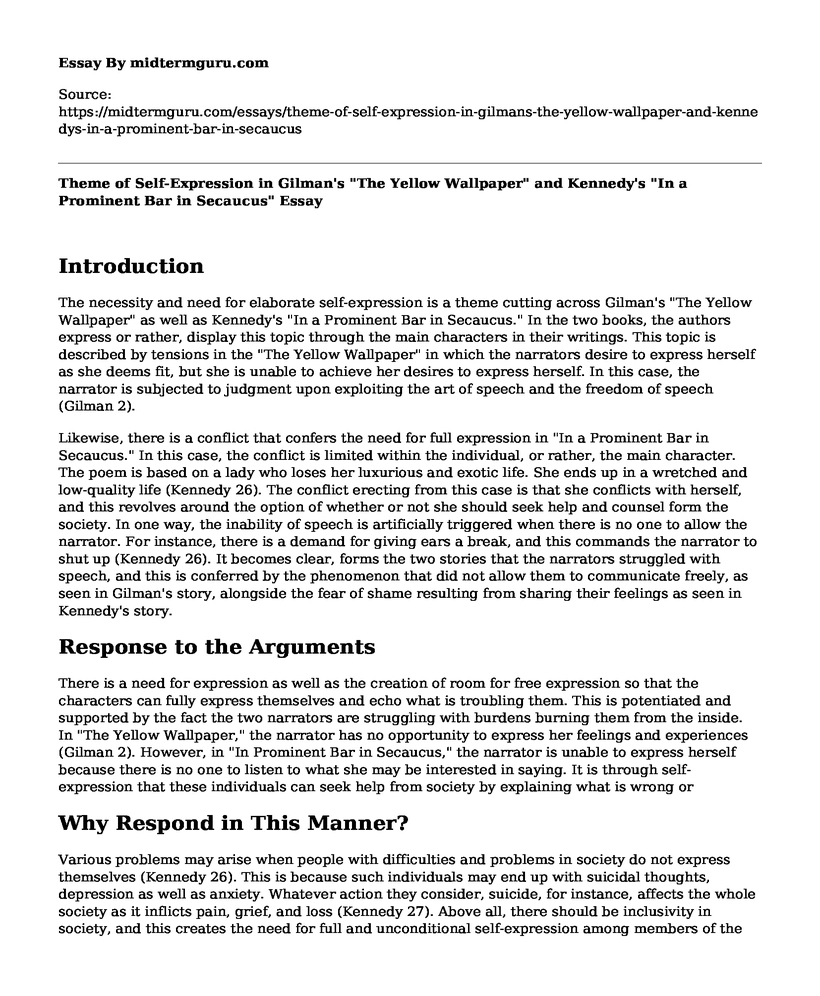Introduction
The necessity and need for elaborate self-expression is a theme cutting across Gilman's "The Yellow Wallpaper" as well as Kennedy's "In a Prominent Bar in Secaucus." In the two books, the authors express or rather, display this topic through the main characters in their writings. This topic is described by tensions in the "The Yellow Wallpaper" in which the narrators desire to express herself as she deems fit, but she is unable to achieve her desires to express herself. In this case, the narrator is subjected to judgment upon exploiting the art of speech and the freedom of speech (Gilman 2).
Likewise, there is a conflict that confers the need for full expression in "In a Prominent Bar in Secaucus." In this case, the conflict is limited within the individual, or rather, the main character. The poem is based on a lady who loses her luxurious and exotic life. She ends up in a wretched and low-quality life (Kennedy 26). The conflict erecting from this case is that she conflicts with herself, and this revolves around the option of whether or not she should seek help and counsel form the society. In one way, the inability of speech is artificially triggered when there is no one to allow the narrator. For instance, there is a demand for giving ears a break, and this commands the narrator to shut up (Kennedy 26). It becomes clear, forms the two stories that the narrators struggled with speech, and this is conferred by the phenomenon that did not allow them to communicate freely, as seen in Gilman's story, alongside the fear of shame resulting from sharing their feelings as seen in Kennedy's story.
Response to the Arguments
There is a need for expression as well as the creation of room for free expression so that the characters can fully express themselves and echo what is troubling them. This is potentiated and supported by the fact the two narrators are struggling with burdens burning them from the inside. In "The Yellow Wallpaper," the narrator has no opportunity to express her feelings and experiences (Gilman 2). However, in "In Prominent Bar in Secaucus," the narrator is unable to express herself because there is no one to listen to what she may be interested in saying. It is through self-expression that these individuals can seek help from society by explaining what is wrong or
Why Respond in This Manner?
Various problems may arise when people with difficulties and problems in society do not express themselves (Kennedy 26). This is because such individuals may end up with suicidal thoughts, depression as well as anxiety. Whatever action they consider, suicide, for instance, affects the whole society as it inflicts pain, grief, and loss (Kennedy 27). Above all, there should be inclusivity in society, and this creates the need for full and unconditional self-expression among members of the society
Conclusion
Freedom of expression and speech as fundamental aspects of life. The two books indicate two distinct scenarios where the narrators have no room to speak for themselves. The net effect of this is that they suffer from their problems as they do not share, or rather, have no one to listen to them. Thus, the need for clear expression oneself. It is through this that individuals will find therapy and solutions to their problems.
Works Cited
Gilman, Charlotte P. The Yellow Wallpaper. Tustin: Xist Publishing, 2015. Internet resource.
Kennedy, X J. In a Prominent Bar in Secaucus: New and Selected Poems, 1955-2007. Baltimore, Md: Johns Hopkins University Press, 2007. Print.
Cite this page
Theme of Self-Expression in Gilman's "The Yellow Wallpaper" and Kennedy's "In a Prominent Bar in Secaucus". (2022, Sep 11). Retrieved from https://midtermguru.com/essays/theme-of-self-expression-in-gilmans-the-yellow-wallpaper-and-kennedys-in-a-prominent-bar-in-secaucus
If you are the original author of this essay and no longer wish to have it published on the midtermguru.com website, please click below to request its removal:
- Essay Sample: What Is Alan Moores Argument of Authority in the Watchmen?
- Literature Essay Example: The Power of Death and Nature in Poems
- Essay on the Three Character Traits of Courage, Love, and Hate Exhibited by Oedipus
- Essay on the Unwavering Leadership Spirit of Ralph in Lord of the Flies
- Essay on Battle Royale by Ralph Ellison
- Piano Critique
- Essay Sample on Politeness in Evelina







